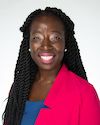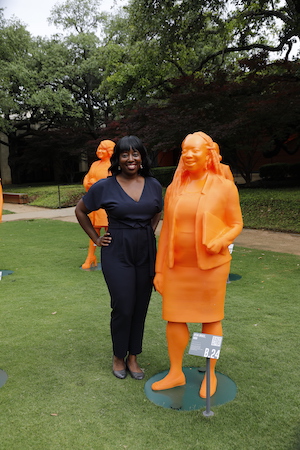Afua Bruce, MBA ’11: Using Her Own Success to Inspire Women to Pursue STEM Careers

While working as a software engineer, Afua Bruce, MBA ’11, enrolled at the Ross School of Business with a specific goal: going into strategic planning and leadership for tech companies, combining her computer science skills with marketing and operations.
Today, she is the chief program officer at DataKind, which applies a combination of data science, machine learning, and artificial intelligence to address some of humanity's most pressing problems.
When Bruce arrived at Michigan Ross in 2009, she had a personal requirement for future employment: no nonprofits or government agencies. But at Michigan, her eyes opened to other possibilities. Upon graduation, she embarked on a seven-year journey with the Federal Bureau of Investigation and White House Office of Science and Technology before entering the nonprofit sector.
“The faculty and students had great energy and seemed to be more interested in my success than selling Michigan Ross for the sake of the school,” Bruce says.
At Ross, I very much appreciated the encouragement to discover how I could find the best path for me, and how I could be supported to gain the right skills to be successful post-graduation.
At DataKind, Bruce works to address vital issues like helping low-income families access funds and creating systems to ensure children live in safe homes.
Outside the office, she’s dedicated herself to solving another world issue: the lack of women in the fields of science, technology, engineering, and mathematics. Today, women make up just 27 % of the STEM workforce, with an even smaller ratio in Bruce’s discipline of computer engineering.
Throughout her career, Bruce has made a concerted effort to engage school-aged children by visiting classrooms for career day, participating in camps to excite girls about engineering and STEM, and taking part in community outreach as an active member of the National Society of Black Engineers.

“I believe strongly in the importance of showcasing the diversity of people who work in STEM,” Bruce says. “This includes gender diversity and racial diversity. It’s also important to show how STEM affects many aspects of our lives; STEM isn’t just in labs and classrooms and basements.”
In late 2019 she was chosen as an American Association for the Advancement of Science IF/THEN Ambassador. The program honors more than 120 women who serve as high-profile role models for girls in middle school.
As a part of this new initiative, Bruce has a much larger platform to highlight her career and share her knowledge. For instance, middle school members of the Girl Scouts of the United States of America looking to earn the Cadette STEM Career Badge are encouraged to watch a video of Bruce discussing her role at DataKind.
She’s also had the opportunity to create educational content by partnering with GoldieBlox, a company that makes fun and innovative toys for girls. Her video responding to the question “Will Computers Take Over the World?!” has more than 100,000 views on YouTube.
As an AAAS IF/THEN Ambassador, Bruce also works with a number of museums across the nation to participate in “meet-a-scientist” sessions and other educational opportunities, which were held virtually during the pandemic.
“I am honored and humbled,” Bruce said. “My first thought was, ‘How did they pick me?’ My second thought was gratitude for the opportunity to do more STEM outreach and to be connected to an incredible group of women doing great work.”
She has also made a few high-profile appearances, including the CBS Saturday morning program Mission Unstoppable, hosted by actress Miranda Cosgrove.
Bruce is also participating in Lyda Hill Philanthropies’ #IfThenSheCan exhibit at Dallas’ NorthPark Center. In the exhibit, over 120 ambassadors, including Bruce, are recognized with life-sized statues. The exhibit is partly a response to a 2016 study finding that the 10 largest U.S. cities have fewer than a half-dozen publicly displayed statues depicting real women.
 In keeping with the STEM theme, each statue was produced using 3D full-body scans and 3D printing. The statues are made of an orange acrylic gel.
In keeping with the STEM theme, each statue was produced using 3D full-body scans and 3D printing. The statues are made of an orange acrylic gel.
Initially delayed due to the COVID-19 pandemic, the exhibit opened in May and Bruce visited later that month. Excited and suppressing nerves, she came upon her own likeness in the midst of rows of other orange statues. She then stood next to it and posed for a couple of photos.
Because it was made from a 3D scan, the image wasn’t identical, but it was close enough for a young girl exploring the exhibit with her mother to pass by Bruce and shout, “Hey, that’s you!” Unsure of how to respond, Bruce said, “yes, it really is!’ — seeing firsthand her immediate impact on the next generation.
“It's not just that we need to create something for the future, but there are women doing this work today,” Bruce said. “I’m hoping that so many little girls are inspired to want their own statues and to work in STEM. At the same time, I also want to inspire little boys to recognize that it's completely normal for women to be in those STEM classrooms and to be contributing in the STEM fields.”







